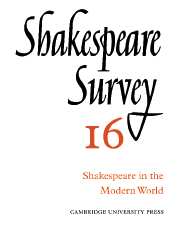Book contents
- Frontmatter
- An Obligation to Shakespeare and the Public
- Our Closeness to Shakespeare
- The Popularity of Shakespeare: An Examination of the Royal Shakespeare Theatre’s Repertory
- Shakespeare and the Fashion of These Times
- An Approach to Shakespearian Tragedy: The ‘Actor’ Image in Macbeth
- Shakespeare’s Impact Today in France
- Shakespeare and the Modern World
- Modern ‘Theatrical’ Translations of Shakespeare
- Shakespeare as ‘Corrupter of Words’
- Shakespeare in Ghana
- ‘Timon of Athens’
- Who Strutted and Bellowed?
- Shakespeare in Planché’s Extravaganzas
- ‘Our Will Shakespeare’ and Lope de Vega: An Unrecorded Contemporary Document
- Shakespeare and the Mask
- International Notes
- Shakespeare Productions in the United Kingdom: 1961
- Acting Shakespeare Today. A review of performances at the Royal Shakespeare Theatre, August 1962
- Canada’s Achievement
- 1 Critical Studies
- 2 Shakespeare’s Life, Times and Stage
- 3 Textual Studies
- Books Received
- Index
- Plate section
1 - Critical Studies
Published online by Cambridge University Press: 28 March 2007
- Frontmatter
- An Obligation to Shakespeare and the Public
- Our Closeness to Shakespeare
- The Popularity of Shakespeare: An Examination of the Royal Shakespeare Theatre’s Repertory
- Shakespeare and the Fashion of These Times
- An Approach to Shakespearian Tragedy: The ‘Actor’ Image in Macbeth
- Shakespeare’s Impact Today in France
- Shakespeare and the Modern World
- Modern ‘Theatrical’ Translations of Shakespeare
- Shakespeare as ‘Corrupter of Words’
- Shakespeare in Ghana
- ‘Timon of Athens’
- Who Strutted and Bellowed?
- Shakespeare in Planché’s Extravaganzas
- ‘Our Will Shakespeare’ and Lope de Vega: An Unrecorded Contemporary Document
- Shakespeare and the Mask
- International Notes
- Shakespeare Productions in the United Kingdom: 1961
- Acting Shakespeare Today. A review of performances at the Royal Shakespeare Theatre, August 1962
- Canada’s Achievement
- 1 Critical Studies
- 2 Shakespeare’s Life, Times and Stage
- 3 Textual Studies
- Books Received
- Index
- Plate section
Summary
Beginning, as we should, with tragedy,we have a remarkable book by John Holloway, which asks us to be baptized into a new way of interpreting Shakespeare. The Story of the Night is contentious and choleric; it is not well planned, and has the air of being hastily written. If Holloway had delayed publication for five years, we might perhaps be welcoming the first real successor to Bradley. But, even as it is, the publication of this book is an important occasion in Shakespeare criticism. The introduction declares total war. The Enemy accepts it that literature exists to offer ‘help to people perplexed over “how to live”’; consciously or unconsciously, he assumes that a work of literature is distinguished by its informativeness; he says that a play asserts or defines certain values. Holloway objects very strongly to a use of language which can make plays ‘assert values’ or ‘obstinately question some of the things that are most deeply disturbing in human life’; it seems to him a muddled use, reflecting a muddled attitude to art. In any case, the values which the Enemy claims that Shakespeare asserts are trite and partial. ‘When. . . critics give accounts of Shakespeare’s explicating and defining which would convict him of being less well-informed about life even than I am myself, I am obliged to infer that they are casting not light but darkness.’ The reason for the insufficiency is that critics ‘have in effect made use of Shakespeare for preaching of their own, writing of his work but venting their personal moralities’.
- Type
- Chapter
- Information
- Shakespeare Survey , pp. 155 - 163Publisher: Cambridge University PressPrint publication year: 1963

